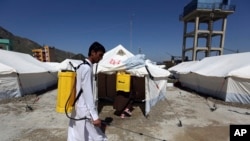The UN refugee agency warns the return of tens of thousands of refugees to Afghanistan from Pakistan and Iran risks overwhelming the country’s medical system and spreading COVID-19.
Pakistan and Iran host some 2.4 million Afghan refugees. Despite persistent risks and insecurity in Afghanistan, thousands of refugees continue to return home. The U.N. refugee agency reports tens of thousands have crossed over the border from Pakistan in the past week and in March. About 60,000 have gone back from Iran.
UNHCR spokesman Babar Baloch says Afghan refugees are returning home at an average daily rate of 1500. He says the coronavirus poses a great threat to Afghanistan’s fragile health system and risks overwhelming its medical and social services capacity.
He adds COVID-19 also is putting immense strain on the health systems and economies of Pakistan and Iran. He says many Afghan refugees are unable to meet their most basic needs because of the sharp economic downturn in their host countries.
“In both countries, those who are employed are commonly hired as daily wage laborers," said Baloch. "Amidst the various levels of lockdowns across the region, such work has abruptly ceased, and Afghan refugees are left with no income and their hosts are now faced with economic threats to their survival.”
So far, Afghanistan has recorded only a few hundred cases of coronavirus and about two dozen deaths. Pakistan has registered nearly 6,000 cases and around 100 deaths. But the World Health Organization reports Iran, with more than 73,000 cases and nearly 5,000 deaths, is the epicenter of the outbreak in South-West Asia,
Baloch says the UNHCR has temporarily suspended the voluntary repatriation of Afghans from Iran and Pakistan in hopes of limiting the risk of refugees and staff contracting the deadly virus.
The UNHCR is appealing for greater international support for all three countries to prevent a larger-scale outbreak of the disease. It says its humanitarian operation in the region is on life-support, noting that only 17 percent of its 315 million-dollar appeal has been funded.
The agency warns failure to support Afghanistan, Pakistan and Iran in their desperate efforts to stave off the pandemic will impact negatively on global efforts to fight the virus.




